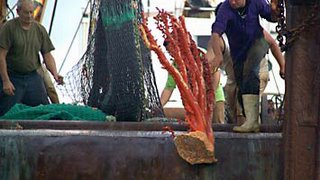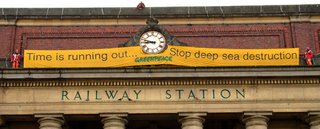Thursday, June 08, 2006
Happy World Oceans Day

Bottom trawling is without a doubt the most damaging form of fishing we are using at the moment. Huge nets are dragged across the sea floor picking up and destroying all within its way- such as this giant gorgonian coral (pictured) that I saw being thrown over board by New Zealand bottom trawlers in International waters
Read about my voyage.
Send a message to Prime Minister Helen Clarke.
The Trawl is in your court, Greenpeace tells Government
Wellington, Thursday 8 June: Greenpeace New Zealand marked World Oceans Day by hanging a large banner across the front of Wellington Railway Station during the morning commuter rush with a message to the Government: "Time is Running Out - Stop Deep-Sea Destruction".
Three climbers scaled the Railway Station with the banner, while commuters walked past sculptures of tree-like corals and weird and wonderful deep-sea creatures.
For the past three years, Greenpeace has been exposing the destruction of bottom trawlers - including New Zealand vessels - in international waters. Over this time Greenpeace has reiterated that 'urgent action' is needed to protect the deep-sea life that scientists say are being pushed to extinction before they are even named.
"The only effective action is a United Nations moratorium on bottom trawling in international waters, but the New Zealand Government's approach has so far been weak and is a hindrance to progress at the UN," says oceans campaigner Mike Hagler. "Instead of leading the push for a UN moratorium, as our Government did with high seas drift netting in 1989, New Zealand is dawdling in the face of extinctions in the deep sea."
"Many countries see New Zealand as a global leader on environmental issues. Without clear and vocal support, the wrong signal is being sent to other countries that are also sitting on the fence. New Zealand needs to actively support the proposal with the intention of bringing other countries with it."
The proposed UN moratorium on high seas bottom trawling has the support of the world's scientific community and now 30 countries, including Sweden, Germany, Indonesia and Brazil.
"Every four seconds marine life in an area of ocean floor the size of ten football fields is wiped out by bottom trawlers in international waters. We want an approach that prevents the irreversible impacts of bottom trawling and protects vulnerable habitats, rather than trawl now, think later."
At present there are about 250-300 high seas bottom trawlers – including about two dozen New Zealand trawlers. This is only 0.3 percent of the three million commercial fishing boats worldwide, and only 0.2 percent of global marine fisheries production. The overall contribution of high seas bottom trawling to global food security is negligible.
Huge bottom trawl nets are bulldozed along the seabed taking all fish, smashing ancient corals and destroying the other marine life that has taken thousands of years to develop.
"Our message to Government is that time is running out for deep-sea life threatened by bottom trawling in international waters. A temporary halt to the practice, imposed by the UN, would buy time to put in place policies and regulations for long-term protection of deep-sea life".
Before World Oceans Day ends, a global fleet of around 300 high seas bottom trawlers will have dragged their heavy nets across an estimated 1,500 km2 of deep-seabed.
For more information contact:
Oceans Campaigner Mike Hagler 021 321 379
Communications officer Dean Baigent-Mercer 021 790 817



